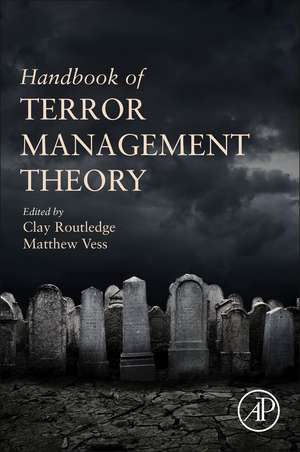Handbook of Terror Management Theory
Editat de Clay Routledge, Matthew Vessen Limba Engleză Paperback – 10 noi 2018
The first section reviews theoretical and methodological issues, the second focuses on basic research showing how TMT enhances our understanding of a wide range of phenomena, and the third section, Applications, uses TMT to solve a variety of real world problems across different disciplines and contexts, including health behavior, aging, psychopathology, terrorism, consumerism, the legal system, art and media, risk-taking, and communication theory.
- Examines the three critical hypotheses behind Terror Management Theory (TMT)
- Distinguishes proximal and distal responses to death-thoughts
- Provides a practical toolbox for conducting TMT research
- Covers the Terror Management Health Model
- Discusses the neuroscience of fear and anxiety
- Identifies how fear motivates consumer behavior
- Relates fear of death to psychopathologies
Preț: 694.91 lei
Preț vechi: 944.20 lei
-26% Nou
Puncte Express: 1042
Preț estimativ în valută:
132.97€ • 139.20$ • 110.02£
132.97€ • 139.20$ • 110.02£
Carte tipărită la comandă
Livrare economică 29 martie-12 aprilie
Preluare comenzi: 021 569.72.76
Specificații
ISBN-13: 9780128118443
ISBN-10: 012811844X
Pagini: 648
Dimensiuni: 152 x 229 x 38 mm
Editura: ELSEVIER SCIENCE
ISBN-10: 012811844X
Pagini: 648
Dimensiuni: 152 x 229 x 38 mm
Editura: ELSEVIER SCIENCE
Cuprins
Section 1: Testing the Contours of the Theory
1. A Consideration of 3 Critical Hypotheses
2. Distinguishing Proximal and Distal Responses to Death-Thoughts
3. Controversies and Alternative Theories
4. TMT Toolbox: A Guide to Doing TMT Research
Section 2: How TMT Helps us Understand
5. The Need to Structure the World
6. Our Relationship with Nature
7. The Self
8. The Self in Time: Nostalgia
9. Human Concerns about Sex, the Body, and Animality
10. Attachment and Romantic Relationships
11. Group Identification
12. Religion
13. Secular Cultural Worldviews
14. Affect, Meaning, and Well-Being
15. Psychological Growth, Creativity, and Exploration
16. Existential Neuroscience: Terror Management and the Brain
Section 3: Applications
17. Health Attitudes and Behavior
18. Aging and Coping with Mortality
19. Psychopathology
20. Terrorism, War, and Peace-Making
21. Consumerism
22. The Legal System
23. Art and Media
24. Death and Risk Taking
25. Communication Theory and Terror Management
1. A Consideration of 3 Critical Hypotheses
2. Distinguishing Proximal and Distal Responses to Death-Thoughts
3. Controversies and Alternative Theories
4. TMT Toolbox: A Guide to Doing TMT Research
Section 2: How TMT Helps us Understand
5. The Need to Structure the World
6. Our Relationship with Nature
7. The Self
8. The Self in Time: Nostalgia
9. Human Concerns about Sex, the Body, and Animality
10. Attachment and Romantic Relationships
11. Group Identification
12. Religion
13. Secular Cultural Worldviews
14. Affect, Meaning, and Well-Being
15. Psychological Growth, Creativity, and Exploration
16. Existential Neuroscience: Terror Management and the Brain
Section 3: Applications
17. Health Attitudes and Behavior
18. Aging and Coping with Mortality
19. Psychopathology
20. Terrorism, War, and Peace-Making
21. Consumerism
22. The Legal System
23. Art and Media
24. Death and Risk Taking
25. Communication Theory and Terror Management
